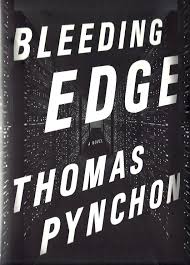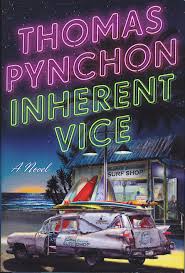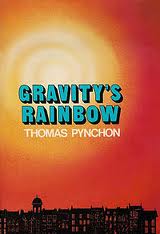 When I started reading Bleeding Edge (2013) within a few hours of amazon’s delivery in September, nostalgia for paranoia hit me hard:
When I started reading Bleeding Edge (2013) within a few hours of amazon’s delivery in September, nostalgia for paranoia hit me hard:
It seemed to him obvious that the human life runs through the varieties of mental disorder…–the solipsism of infancy, the sexual hysterias of adolescence and entry-level adulthood, the paranoia of middle age, the dementia of late life…all working up to death, which at last turns out to be “sanity” (2).
My shock of recognition wasn’t about this faux-Freudian rewrite of Shakespeare’s Seven Ages of Man but about me personally, about how much my life has been filtered through Pynchon’s strange books. I felt personally implicated in his new NYC summer-before-9/11 novel, as if there was some secret me inside these weird sentences, their rhythms, half-steps, mad excesses, violent rages, and schmaltzy sentiment.
What if I were to tell my autobiography through quotations from Thomas Pynchon?
I started with Gravity’s Rainbow (1973) in high school, when I’m pretty sure I didn’t understand it.
A screaming comes across the sky. It has happened before, but there is nothing to compare to it now (3).
Read V. (1963) during my freshman year in college.
V.’s is a country of coincidence, ruled by a ministry of myth. Whose emissaries haunt this century’s streets. Porcepic, Mondaugen, Stencil pere, this Maijistral, Stencil fils. Could any of them create a coincidence? Only Providence creates. If the coincidences are real, then Stencil has never encountered history at all, but something far more appalling (450).
Read The Crying of Lot 49 (1966) when I was a sophomore in college, shifting my major from math to English.
But how long, Oedipa thought, could it go on before collisions became a serious hindrance? There would have to be collisions. The only alternative was some unthinkable order of music, many rhythms, all keys at once, a choreography in which each couple meshed easy, predestined. Something they all heard with an extra sense atrophied in herself. She followed her partner’s lead, limp in the young mute’s clasp, waiting for the collisions to begin. But none came. She was danced for half an hour before, by mysterious consensus, everybody took a break, without having felt any touch but the touch of her partner (131).
Re-read Gravity’s Rainbow during the spring of my junior year to write a big academic paper mashing it together with the War in Heaven in Book 6 of Paradise Lost. You know, the sublimity of cartoonish violence.
Well, if the Counterforce knew better what those categories concealed, they might be in a better position to disarm, de-penis and dismantle the Man. But they don’t. Actually they do, but they don’t admit it. Sad but true. They are as schizoid, as double-minded in the massive presence of money, as any of the rest of us, and that’s a hard fact. The Man has a branch office in each of our brains, his corporate emblem is a white albatross, each local rep has a cover known as the Ego, and their mission in this world is Bad Shit. We do know what’s going on, and we let it go on (712-13).
Must have read Slow Learner (1984) sometime around then too. I still love these lines from his introduction to his earlier work.
The two impulses have given way to one of those episodes of middle-aged tranquility, in which I now pretend to have reached a level of clarity about the young writer I was back then. I mean I can’t very well just 86 this guy from my life. On the other hand, if through some as yet undeveloped technology I were to run into him today, how comfortable would I feel about lending him money, or for that matter even stepping down the street to have a beer and talk over old times? (3).
Read Vineland (1990) when I was traveling in Australia. I had some trouble coming to grips with this new, post-tragic Pynchon.
So, over time, Hell became a storied place of sin and penitence, and we forgot that its original promise was never punishment but reunion, with the true, long-forgotten metropolis of Earth Unredeemed (383).
 Read Mason & Dixon (1997) during what was certainly the best summer of grad school.
Read Mason & Dixon (1997) during what was certainly the best summer of grad school.
Newcomers to the Ley-borne Life are advis’d not to look up, lest, seiz’d by its proper Vertigo, they fall into the Sky. — For ‘t has happen’d more than once, — drover and Army officers swear to it, — as if Gravity along the Visto, is becoming locally less important than Rapture (651).
Read The Collected Letters of Wanda Tinasky (1996) that same summer, after I’d been through Mason & Dixon twice, because I couldn’t stop. The letters seemed pretty clearly not-Pynchon, though I didn’t know the tragedy surrounding their presumed author until I looked it up today.
[no quotation]
Read Against the Day (2006) several months — maybe as many as three? — after it was published, mostly standing on the London Underground when I was in Greenwich as a fellow at the Maritime Museum, starting work on the shipwreck book I’m finishing now.
As if the Straits of Gibraltar acted as some metaphysical junction point between the worlds. In those days to pass through that narrow aperture into the vast, uncertain field of Ocean was to leave behind the known world, and perhaps its conventions about being in only one place at a time… Once passed through, did the ship take two tacks at once? Did the wind blow two ways? Or was it the giant fish that possessed the power of bilocation? Two fishes, two Jonahs, two Agadirs? (521-22)
Read Inherent Vice (2009) in late summer, right when it came out.
Doc wondered how many people he knew had been caught out tonight in this fog, and how many were indoors fogbound in front of the tube or in bed just falling asleep. Someday — he figured Sparky would confirm it — there’d be phones as standard equipment in every car, maybe even dashboard computers. People could exchange names and addresses and life stories and form alumni associations to gather once a year at some bar off a different freeway exit each time, to remember the night they set up a temporary commune to help each other home through the fog. (368)
 Finishing Bleeding Edge (2013) just now, & getting ready to teach it tomorrow night.
Finishing Bleeding Edge (2013) just now, & getting ready to teach it tomorrow night.
Time travel, it turns out, is not for civilian tourists, you don’t just climb into a machine, you have to do it from inside out, with your mind and body, and navigating Time is an unforgiving discipline. It requires years of pain, hard labor, and loss, and there is no redemption — of, or from, anything (242-43).
Years ago, I remember reading a little note or prose-poem by Charles Simic (I think), suggesting a compilation of menus for every meal as an alternative autobiography. The quantified self movement promises something along these lines, and probably google can write a similar story for our online avatars.
But still, I like this Pynchon-flavored self. If I did bump into him in some techno-utopian poly-chronic downtown, I’d be happy to buy him a beer. Probably just one, since I figure he’s driving.

Leave a Reply